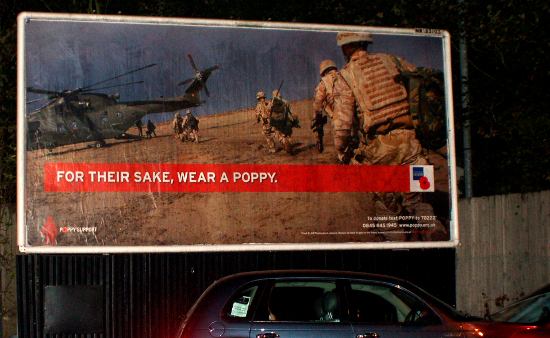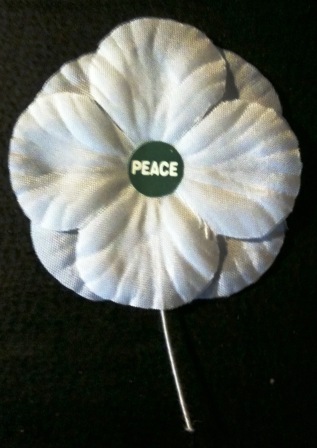This time of year always reminds me about Cannon’s quote ‘no-one
is born a Bolshevik.’ That’s because a decade ago, I would have spent the last
few weekends in a full Royal Navy dress uniform selling British Legion poppies
round my town centre. On Remembrance Sunday, I would be one of the six armed
honour guards on town Cenotaph.
A decade later and I find early November frustrating with
all the Poppy talk on TV and Radio. Usually this takes a very familiar rigmarole
with some pariah being admonished for not bowing at the National Altar of
Sacrifice that poppy wearing represents. This year it was Fifa who earned the
hatred of all right-thinking Englishmen by daring to consistently apply a rule
about political symbols to all national teams. Arguing that Poppies aren’t
political is sheer bollocks but it does show something interesting, namely the
enforced act of conformity that it has become to wear a Poppy. The argument
goes that Poppy-wearing is so wide-spread, so deep that it has transcended mere
political limits to become something natural.
As the picture below shows, the annual Poppy Appeal is
anything but apolitical – it directly contributes to support for current
illegal wars and occupations. Wars that are currently killing both Afghan and
British working class people in what is little more than a ruling-class game of
Risk.
On top of this, the whole idea of ‘Remembrance Day’ is bound
up with the idea of British nationalism. To take part in events, you have to
accept that the millions of people from these islands who died over the 20th
Century died for their ‘country’. As such, there is a surge of nationalism that
accompanies the Poppy and for a moment, it does look like we’re all in this
together.
If that were the only part of this story, then the problem
would be simple: Damn the Tory scum and let the class war sort it out. Unfortunately,
there are a large number of people who wear Poppies who do so for very normal
reasons. These aren’t just those with relatives in the Army but those who have
a genuine abhorrence of war, particularly the slaughter of the First World War
(the Second being more morally confusing for many). It is these people that
create the biggest problem for revolutionaries as many are part of our natural
audience. How then to tackle this problem?
I get round this by wearing a White Poppy at work. Produced
by the Peace Pledge Union this is really a pacifist symbol (something I’mcertainly not) but I find it provides a useful in to the debate about Poppies –
it is neither refusing to wear something (after all, I am not ambivalent to the
question of war and imperialism in capitalism) but nor is it giving a left face
to the Poppy Appeal, as many Labour lefts do. It provides the perfect tension
with other workers and allows you to say: at this time I have no problem with
joining with other workers to contemplate the horrors of Imperialism, but I’ll
be damned if I’ll do it for the same reason as the Queen, Cameron or Hugh
Dannett and wearing the same symbol.’
Hopefully, a day will come when I won’t even have to wear a
White Poppy. Until then though, below is an extract from the book I am
currently reading, Johnny Got His Gun by Dalton Trumbo. I offer it as antidote
to all the sick pageantry of Remembrance Sunday.
Somebody said let's go out and fight for liberty and so they went and got killed without ever once thinking about liberty. And what kind of liberty were they fighting for anyway? How much liberty and whose idea of liberty? Were they fighting for the liberty of eating free ice cream cones all their lives or for the liberty of robbing anybody they pleased whenever they wanted to or what? You tell a man he can't rob and you take away some of his liberty. You've got to. What the hell does liberty mean anyhow? It's just a word like house or table or any other word. Only it's a special kind of word. A guy says house and he can point to a house to prove it. But a guy says come on let's fight for liberty and he can't show you liberty. He can't prove the thing he's talking about so how in the hell can he be telling you to fight for it?
If there could be a next time and somebody said let's fight for liberty he would say mister my life is important. I'm not a fool and when I swap my life for liberty I've got to know in advance what liberty is and whose idea of liberty we're talking about and just how much of that liberty we're going to have. And what's more mister are you as much interested in liberty as you want me to be? And maybe too much liberty will be as bad as too little liberty and I think you're a goddamn fourflusher talking through your hat and I've already decided that I like the liberty I've got right here the liberty to walk and see and hear and talk and eat and sleep with my girt I think I like that liberty better than fighting for a lot of things we won't get and ending up without any liberty at all. Ending up dead and rotting before my life is even begun good or ending up like a side of beef. Thank you mister. You fight for liberty. Me I don't care for some.
They were always fighting for something the bastards and if anyone dared say the hell with fighting it's all the same each war is like the other and nobody gets any good out of it why they hollered coward. If they weren't fighting for liberty they were fighting for independence or democracy or freedom or decency or honor or their native land or something else that didn't mean anything. The war was to make the world safe for democracy for the little countries for everybody. If the war was over now then the world must be all safe for democracy. Was it? And what kind of democracy? And how much? And whose?



Interesting questions. But as with many things, I think the people who are passionate about the issues over-think it - when the vast majority of people the symbolism of the poppy is just in memory of those who died (not just for our country, or any country). For me that is the real meaning.
ReplyDeleteWe shouldn't accept other organisations and people can hijack it and change it's meaning.
I'm not so sure its a simply as you say a. How many people do you think use 11 November to think about German or Afghani or Iraqi dead?
ReplyDelete